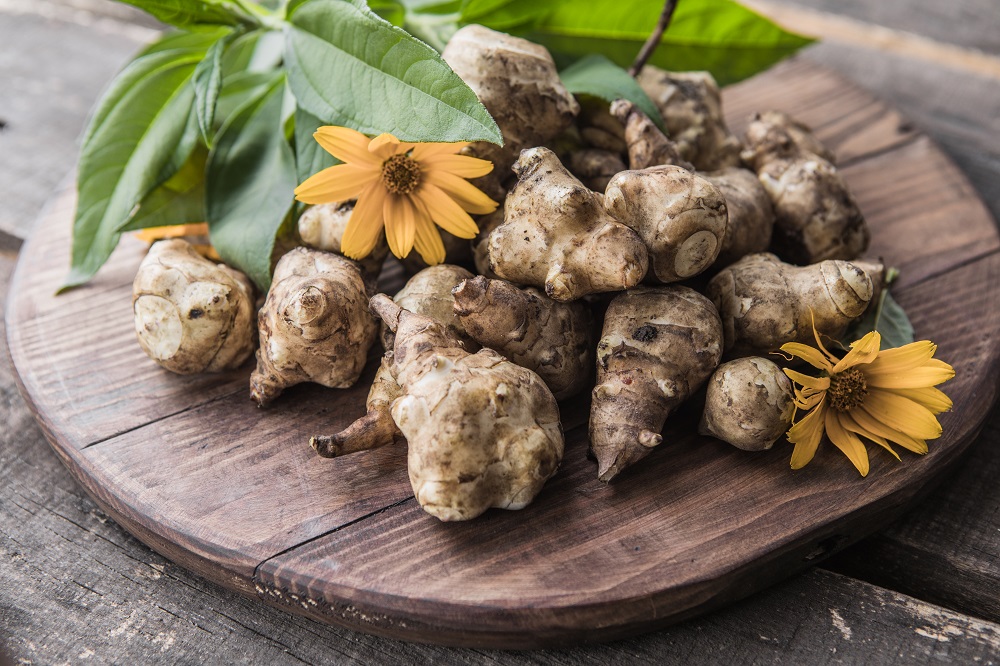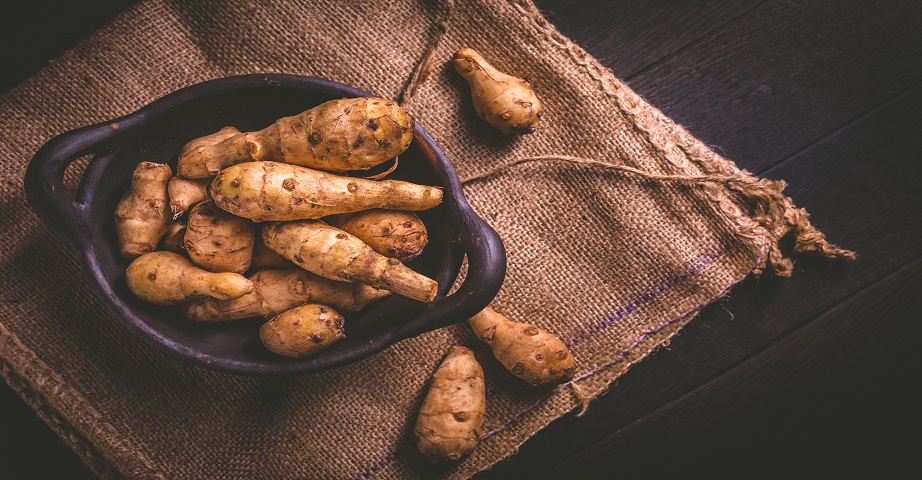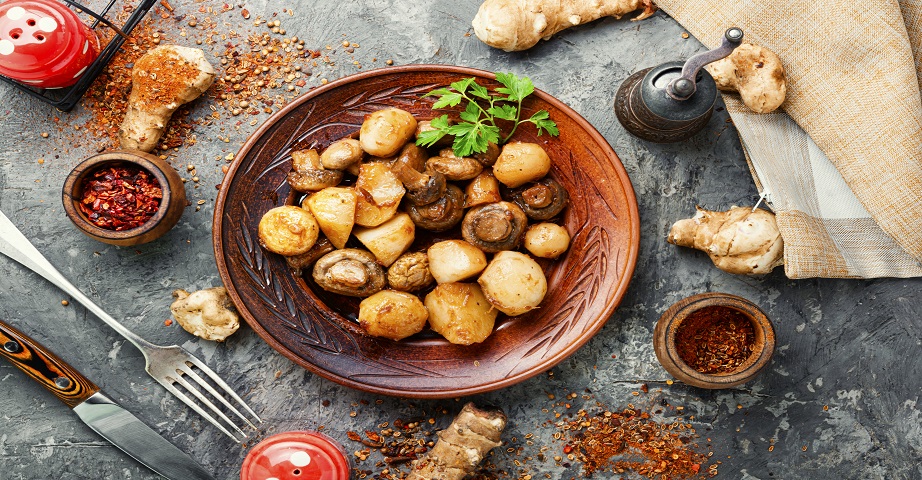Jerusalem artichoke - recipes and properties of sunchoke

Jerusalem artichoke is a plant comes from North America, which can be successfully used in the kitchen, among others, as an alternative to potatoes. The tuber of the plant resembles ginger in appearance, while in taste - radish. After thermal processing, the aroma of the vegetable changes and acquires a unique, slightly nutty taste. However, the sunchoke is not only a product that delights taste buds. It is also a wealth of valuable ingredients and health-promoting properties.
How can sunchoke affect the body? Is it worth including it in the daily diet? What dishes can be made from vegetable? It's time to get to know Jerusalem artichoke and recipes with his participation!
What is Jerusalem artichoke?
Jerusalem artichoke, or sunchoke or topinambour (from the Latin language Helianthus tuberosus L.) is a plant belonging to the Asteraceae family. It comes from North America and came to Europe with Christopher Columbus. Jerusalem artichoke is related to sunflower, and its name "topinambour" comes from the Indian tribe Tupinamba from North America. Currently, the sunchoke is grown in both hemispheres. The plant can be found both in North and South America, as well as in Europe or Asia, and even in New Zealand and the Azores.
Sunchoke is appreciated as an edible plant, as well as fodder and ornamental. It is distinguished by small requirements, which makes it grow in a variety of conditions and effectively spreads. It is considered an invasive species in some areas.
What does Jerusalem artichoke look like? Sunchoke is distinguished by a long, white-haired stem, which can reach a height of up to 3 meters. The leaves of the plant are light green and have an ovoid shape. In turn, a pubble flower, which is the culmination of the stem, is big and yellow. Under the ground, there is a second part of the plant, which looks like ginger root. The stolons of sunchoke can reach up to 1 meter in length. At their ends, tubers with convex meshes are formed, which can take different shapes. The color of the skin of Jerusalem artichoke depends on the variety of the plant - it can take yellow, red or purple shades. The pulp of the tuber is white or yellow, and the taste of topinambour is delicate. Sunchoke blooms in late summer and autumn. Its tubers are picked in late autumn, until the first frosts appear.
Nutritional values of Jerusalem artichoke
The most important component of the Jerusalem artichoke is inulin, which is a reserve material of the sunchoke, which accounts for about 80% of the weight of vegetable and is the main type of carbohydrates present in the plant. Inulin is a polysaccharide, classified as fructooligosaccharides, which is a soluble fraction of dietary fiber. The compound in the digestive system reaches the large intestine, and there it is metabolized by bacteria, thanks to which inulin is considered a prebiotic, which is a culture medium for the intestinal microflora. In the sunchoke can also be distinguished an insoluble fraction of dietary fiber, which consists of cellulose, hemicellulose, as well as lignin and pectin compounds.
In addition, the Jerusalem artichoke tubers are a valuable source of potassium and iron. In the tuber of the plant, can also find small amounts of other nutrients, such as calcium, magnesium, phosphorus, as well as B vitamins or vitamin C.
The vegetable is classified as low-energy products - 100 g of the product provides the body with 73 kcal. In addition, the fresh sunchoke is distinguished by a low glycemic index. However, it is worth remembering that under the influence of thermal processing, IG of the Jerusalem artichoke may increase.
Sunchoke - properties and act
As we mentioned earlier, inulin present in the plant tuber is classified as prebiotic substances. Thus, the Jerusalem artichoke can affect the growth of beneficial intestinal microflora, including increasing the amount of bacteria of the genus Lactobacillus or Bifidobacterium in the body. The scientific data suggest that even small amounts of inulin in the daily diet can positively affect the human body and intestinal function.
In addition, the Jerusalem artichoke can have a positive effect on the work of the cardiovascular system, contributing to the improvement of the lipid profile and causing a decrease in the level of total cholesterol and LDL fraction in the blood serum and a decrease in triglycerides. As a valuable source of potassium, the sunchoke can also have a significant effect on lowering blood pressure.
Regular consumption of vegetables can also contribute to the improvement of carbohydrate metabolism. The Jerusalem artichoke, as a source of inulin, may affect the reduction of fasting glucose in blood serum, as well as the reduction of insulin levels. The soluble fraction of dietary fiber may also cause a decrease in the level of glycosylated hemoglobin and the index of insulin resistance (HOMAR-IR). Thus, the inclusion of sunchoke in the diet can have a positive effect on people struggling with prediabetes or type II diabetes.
Inulin present in the plant can help to increase the absorption of minerals such as calcium, magnesium, zinc or copper. Regular consumption of the Jerusalem artichoke tuber can lead to an increase in the level of these components in the human body. At the same time, the sunchoke can positively affect bone mineral density and their strength.
The vegetable can also be helpful in preventing constipation, because the compounds present in the plant can help improve bowel movements and soften stool. In addition, the topinambour can support detoxification of the body and reduce the level of uric acid in the body. The sunchoke may also have immunostimulatory properties and have a positive effect on the functioning of the immune system. In addition, the plant can protect the gastric mucosa.
Thanks to the richness of dietary fiber, the Jerusalem artichoke can increase the feeling of satiety and inhibit hunger, and in addition, through a beneficial effect on glucose metabolism, it can be helpful in weight reduction. However, there is still a need for further research on the impact of the Jerusalem artichoke on the weight loss process.

Jerusalem artichoke - use in the kitchen
Jerusalem artichoke is a plant that is often used for culinary purposes. It is a product that is famous not only for its pro-health properties, but also for its unique aroma, reminiscent, depending on the variety, of the taste of sunflower seeds, radishes or Brazil nuts.
Edible tubers of sunchoke can be eaten raw - just peel the vegetable and cut it. Then, the Jerusalem artichoke can be used as an addition to salads or cottage cheese, giving the dishes a sweet and gently nutty taste.
The topinambour tubers can be used for pickling. The vegetable is also perfect for thermal processing as well as for preservation. Using the Jerusalem artichoke for baking, cooking or frying, it does not need to be peeled - since many valuable nutrients are just under the peel, the vegetable is enough to wash and clean.
Cooked or baked sunchoke can successfully be an alternative to potatoes. In addition, the vegetable is suitable as a component of soups or casseroles, as well as the main component of delicate fries.
However, it is important to consume the Jerusalem artichoke soon after digging - the plant quickly ages, losing both visual and nutritional qualities.
The Jerusalem artichoke, due to its low glycemic index, is used for the production of food intended for diabetics. In addition, thanks to the richness of inulin, the tubers of the plant can be used in the food industry, acting as a thickener.
Jerusalem artichoke - recipes
Sunchoke is a grateful vegetable that can be used in many ways. It is a product that can be eaten raw, with the addition of onions or baked along with grated yellow cheese or cheddar cheese. It is a component of the diet that is suitable for the preparation of various dishes. What can be conjured from the Jerusalem artichoke tuber? Time for recipes with the sunchoke in the main role!
Hummus from Jerusalem artichoke
A healthy paste that will be perfect both as a spread for sandwiches, as well as a dip for fresh vegetables or fries, or hummus from the Jerusalem artichoke.
Necessary ingredients:
- Jerusalem artichoke cooked in uniforms,
- can of chickpeas,
- 2 spoons of tahini paste,
- one clove of garlic,
- flat teaspoon of cumin,
- 2 teaspoons of lemon juice.
Method of preparation: Cooked sunchoke peel, and then cut into pieces. Put drained chickpeas, Jerusalem artichoke, as well as other ingredients into the blender. Blend all products to a smooth mass.
Salad with sunchoke and pear
The Jerusalem artichoke tuber is an ingredient that will be great as an addition to a salad or as the main protagonist of a vegetable dish. You can create a salad from products that you have at hand, but you can also use our recipe proposal with the Jerusalem artichoke.
Necessary ingredients:
- 2 Jerusalem artichoke tubers,
- 2 cloves of garlic,
- 1 red onion,
- 1 ball of mozzarella,
- one handful of rocket,
- 1 pear,
- olive oil,
- favourite spices.
Method of preparation: Wash topinambour and cut into thin slices. Peel garlic and onions and finely chop. Mozzarella cut into cubes, while rocket - rinse under running water. Peel the pear and cut into cubes. Mix the chopped onion together with sunchoke and other ingredients. Sprinkle the whole with olive oil and season with favourite spices at the discretion.
Fries from sunchoke
Everybody likes fries. Sometimes comes the moment of blimp out of potatoes. Then a good solution may be to create fries from sweet potato or... from Jerusalem artichoke! The vegetable is perfect as a baked snack and will delight your taste buds and palates of all members of your family.
Necessary ingredients:
- 6 Jerusalem artichoke tubers,
- rapeseed oil,
- favourite spices.
Method of preparation: Purple tubers of the plant peel and cut into thin posts. Prepare a marinade from your favourite spices and rapeseed oil. Jerusalem artichoke put in a bowl with marinade and mix. Leave for 30 minutes. During this time, heat the oven to 180 degrees. Place the fries on a baking sheet lined with baking paper and bake for about 15 minutes until browned.

Side effects and contraindications to the use of Jerusalem artichoke
Jerusalem artichoke is considered to be a plant safe for health, therefore, contraindications to its use have not been established.
However, since the inulin present in the vegetable is not digested in the gastrointestinal tract, consuming the Jerusalem artichoke tubers in large quantities can contribute to the occurrence of undesirable side effects, such as abdominal pain, constipation and diarrhea or bloating.
The use of moderate amounts of sunchoke, not exceeding 20 g per day, should not cause any discomfort.

